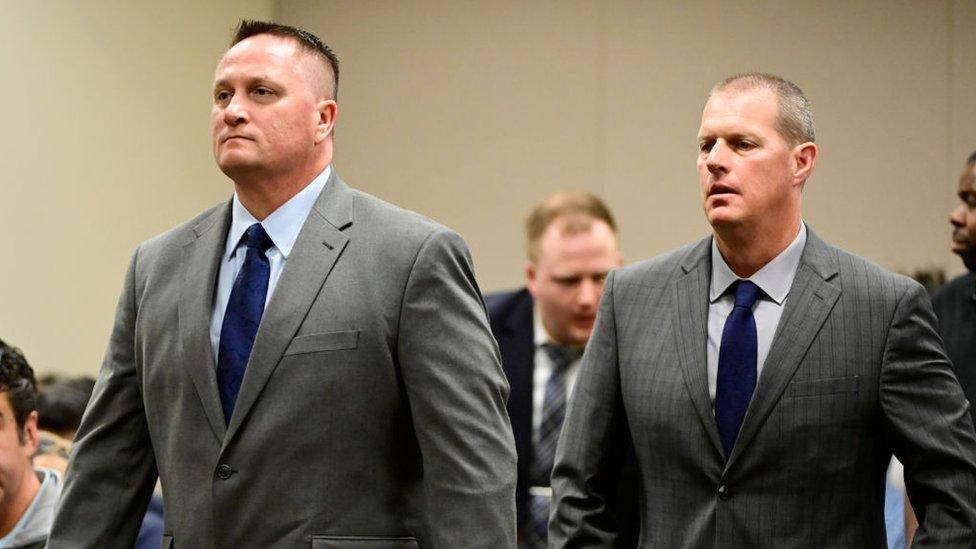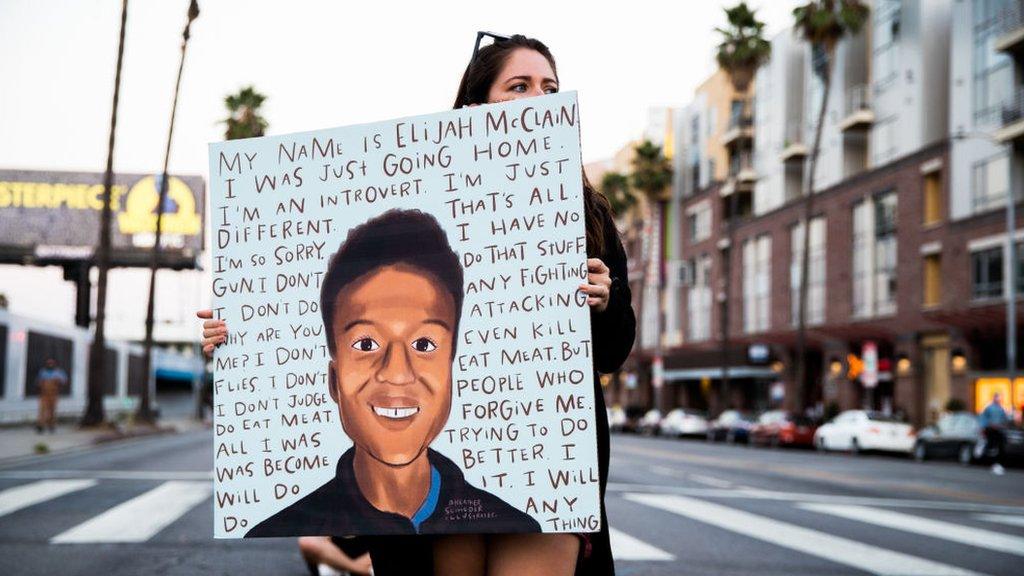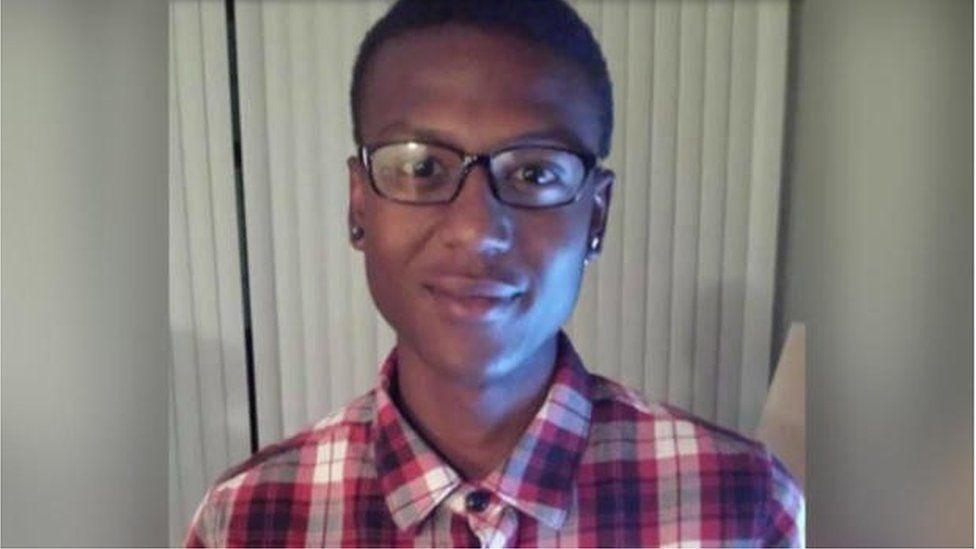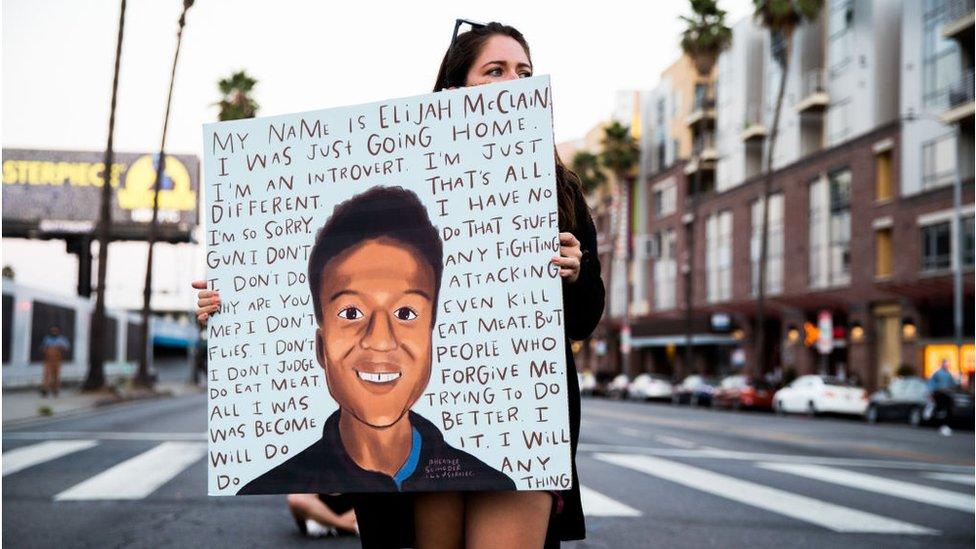Elijah McClain: Trial of paramedics charged in death begins
- Published

Opening arguments begin on Wednesday in the trial of paramedics Jeremy Cooper and Peter Cichuniec
The paramedics charged in the death of Elijah McClain "failed him at every single step", the prosecution has said as the trial for the two men begins.
Jeremy Cooper and Peter Cichuniec have pleaded not guilty to manslaughter, criminally negligent homicide and second-degree assault.
Their trial is the last of three to stem from the 2019 death of Mr McClain in a Denver suburb.
One police officer was found guilty in October of homicide and assault.
Mr McClain, a 23-year-old black man, was walking home when he was stopped by three white police officers responding to a call about a "sketchy" individual in the area.
At the time of the incident, on 24 August 2019, he was wearing headphones and a balaclava to protect himself from chronic chills caused by anaemia, his family has said. Mr McClain initially ignored the officers' commands to stop.
He was placed in a chokehold during the confrontation that followed. Bodycam footage of the incident shows him repeatedly telling officers: "I can't breathe."
After he was restrained, Mr Cooper and Mr Cichuniec injected him with ketamine, a powerful sedative. He never regained consciousness and died after being removed from life support three days later.
Two officers involved in the incident, Nathan Woodyard and Jason Rosenblatt, were acquitted of charges in November and October, respectively.
Mr Woodyard was reinstated on the Aurora police force Monday and will receive $200,000 (£158,000) in back pay, The Guardian reported.
A third officer, Randy Roedema, was found guilty of criminally negligent homicide and third-degree assault. Prosecutors in that case argued that his statement that "he's definitely on something" contributed to the paramedics' decision to inject him with ketamine.
In opening remarks on Wednesday, Colorado Solicitor General Shannon Wells Stevenson laid out the prosecution's case, pointing to several things that she said the defendants did that ultimately led to Mr McClain's death.
Ms Stevenson said paramedics should not have given Mr McClain 500mg of ketamine - the maximum dose. Mr McClain, who weighed 145lb (65kg), should have received significantly less.
She argued that, after administering the ketamine, the defendants should have monitored Mr McClain and should not have kept him in the face down position, restricting his airways.
"They didn't speak one word to him," Ms Stevenson said, concluding that Mr McClain would have been better off if the paramedics had never arrived at the scene.
In their remarks, the defence said Mr McClain was an innocent man who should be alive today. But they argued that the two paramedics were given inaccurate information - they were told that it had taken three police officers at the scene to get him to ground.
"They were never told that Elijah said he couldn't breathe," defence attorney Shana Beggan told jurors. "Who's in control of the scene? It's law enforcement. They're in control the entire time."
Ms Beggan said they were also told he tried to grab a gun, a fact disputed in previous trials in the case.
The paramedics were trying to de-escalate a tense situation, the lawyers argued, saying the men followed appropriate protocols.
According to the original indictment, the paramedics believed that Mr McClain was suffering from excited delirium, a condition they believed meant he was "not in the right state of mind" and potentially hyper-aggressive.
"They don't have discretion, they're not doctors. They have to give ketamine," Ms Beggan said. "That's the treatment."
The death of Mr McClain faced renewed public scrutiny after the death of George Floyd at the hands of Minnesota police the following year.
While it is rare for paramedics and first responders to face criminal charges, several other similar cases are pending across the US.
In Illinois, for example, two paramedics are facing murder charges for the suffocation and death of a patient who was strapped face down on a stretcher.
In a separate case in Los Angeles County, a nurse has been charged with involuntary manslaughter for allegedly taking blood from an unresponsive suspect who was being pinned down by police officers.
Roedema, the police officer, is scheduled to be sentenced in January.
Watch: Mother of Elijah McClain reacts to police officer's acquittal
Related topics
- Published7 November 2023

- Published13 October 2023

- Published1 September 2021
